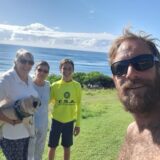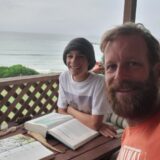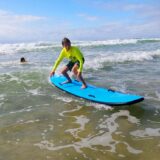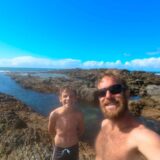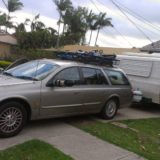Unlike many people who make the decision to travel, we did not have $100 000 to buy a nice 4WD and caravan, in fact we less than a 1/4 of that. That’s right, we drove away for less than $20k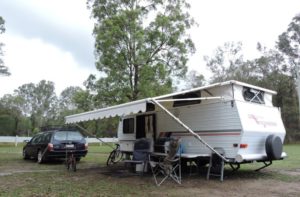
Our car:
Our tow car of choice was a bit of a no brainer, considering I already owned it. It’s a 2001 AU V8 Falcon wagon. With a rated towing capacity of 2.3T, 190kw and 410nm of torque after some minor modifications, it’s more than capable of pulling our approx 1800kg caravan. Here’s a few other dot points on why we chose a falcon wagon in no particular order:
- Cheap car = Cheap insurance: Keeping ongoing costs down is critical in allowing us to travel.
- Spare parts: Because Falcons are so common, spare parts are very cheap. Even the more expensive V8 engines can be sourced for under $100. 6cyl engines for as little as $1000 with a warranty.
- Servicing: Because it is a basic V8 engine with leaf suspension, routine servicing and repairs are very cheap and easy to do.
- Suspension design: Being a leaf sprung rear end, it was suited to having the extra weight with just a few minor modifications
- Less tech = less problems: I’m of the belief that the more complicated a car is, the more there is to go wrong. A Turbo diesel 4WD is a common vehicle of choice for towing and with good choice. However with an engine, a turbo, 2 differentials, 1ton of extra weight and more complicated suspension there is far more to go wrong. Because we didn’t have the money to buy a ‘newer’ 4WD, taking mechanical failures into consideration was critical when choosing a car.
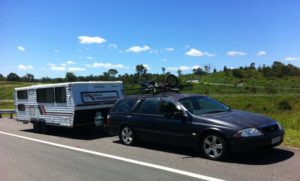
- Car to Caravan weight ratio: Because our caravan is around 1800kg fully loaded and the car is about the same, this satisfied my need to not have a caravan that was far heaver than my car. Many people do, and they do so legally, however I far prefer to have a caravan lighter than my car for piece of mind.
- Economy: Whilst the words V8 and economy are not generally 2 words you’d hear in the same sentance, this is true. Because of the body design and weight of the Falcon, our economy is considerably less than a petrol 4WD from the same era / price bracket. Given that we are also running LPG it means fuel costs are again lowered whilst having a good 700kg of range when towing. Typically, we get 14-16L/100 on petrol, and 16-18L/100 in LPG. This does vary massively depending on terrain type and head wind. The highest I have seen on petrol is 17.5L/100 with a 40km/h head wind.
In order to get our car ready for full time travels, I performed the following modifications and upgrades (Items marked with * were not necessary, rather items I chose to upgrade or replace)
- Second hand extractors and Exhaust*
- Reusable K & N Air filter*
- Reset leaf springs raised 1.5″ over standard with an extra leaf added for stiffness.
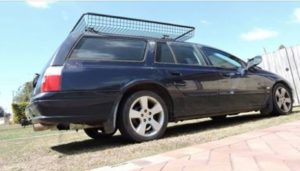
- Heavy duty shocks all round
- 2.3 ton tow kit
- Large heavy Duty transmission cooler
- 52mm 2 row alloy radiator*
- All new front suspension bushes
- New front hubs*
- Cooler thermostat*
- Slotted brake rotors and upgraded pads
- Low KM engine with reconditioned heads, I also added 1.7 roller rockers*
- Roof cage to carry our bikes*
- Tekonsha brake controller
- Uniden UHF
- Roof mounted LED light bar
- UHF Radio*
- Cargo barrier*
- New Water pump*
All up, including replacing the engine and the origonal purchase cost, the car owes me a smidge under $5000.. It’s not the prettiest thing on the road, nor will it take us off road like a 4WD, but it does what we want it too and all with a sweet V8 Rumble..
Our Caravan
Our caravan is a 1989 Coromal Lowline poptop. 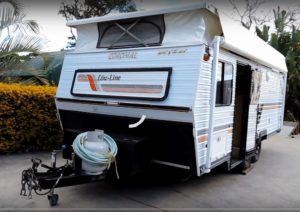
I will list its features below which also covers most of the reasons why we chose this van:
- Triple bunks + Double bed
- Dual axle
- Independent Suspension
- Alloy frame
- Electric brakes
- Full oven, 4 burner stove, grill and rangehood
- 120L 2 way dometic fridge (Gas and 240v)
In order to allow us to live off grid, I set about installing a 12v system that met our needs and allow us to live comfortably. it consists of:
- 1 x 150ah AGM GIANT battery
- 1 x 30amp Tracer MPPT controller + remote display
- 1 x 220w Solar panel – Mounted to van
- 1 x 120w Portable panel (Wired in parallel to give 60w @ 44v, matching the 220w panel voltage)
- 1 x 1000w inverter
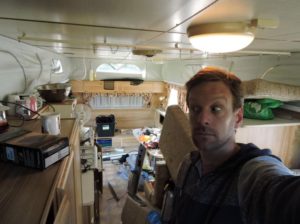
- LED Lighting throughout
- 3 x dual 12v plugs
- 3 x single 12v plugs
- 70amp 12v distribution panel/fuse block
- 100amp master kill switch
- 12v PC fans with voltage regulator and temperature control switch to vent heat from the back of the fridge
- 30amp ABR DCDC charger in tow car should battery require a top up.
This setup allows us to live comfortably indefinitely. We can comfortably do 2 days in bad weather before we either need to start conserving power to topping up the battery via the DCDC charger. Due to space / weight constraints and the pain of carrying petrol, we do NOT travel with a generator. As far as our devices go, we power our laptops, lighting, 12v modem, charge cameras/phones and have a 240v TV for watching movies / docos together. I also travel with a 240v drill, angle grinder, soldering iron and a 12v rattle gun that whilst are seldom used, do prove to be lifesavers when we need them!
In order to allow us to spend more time camping off grid, we removed the large toolbox and single gas bottle holder and had it replaced with a dual gas bottle holder. This also allowed space for our Hayman Reece Weight distribution hitch.
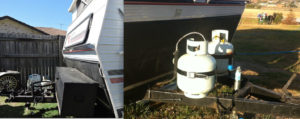
A frame before and after modifications.
I also added 2 extra 57L water tanks giving us a total of 171L of water storage. To make life a little easier I also installed a 12v water pump which connects to the sink as well as an external outlet for our 12v shower which we use with a shower tent however we often ship in water in a 20L container or pump water from fresh water creeks for showers keeping our on board water for dishes etc. We do not run any water filter as we generally purchase drinking water in 10L containers for $4.
Whilst it was lots of work, the modifications we have made allow us to live very comfortably off grid which was critical for us. There will be more in depth articles and videos of the process coming soon! If there’s something you’d like me to cover specifically, please head over to our Connect page and let me know!


